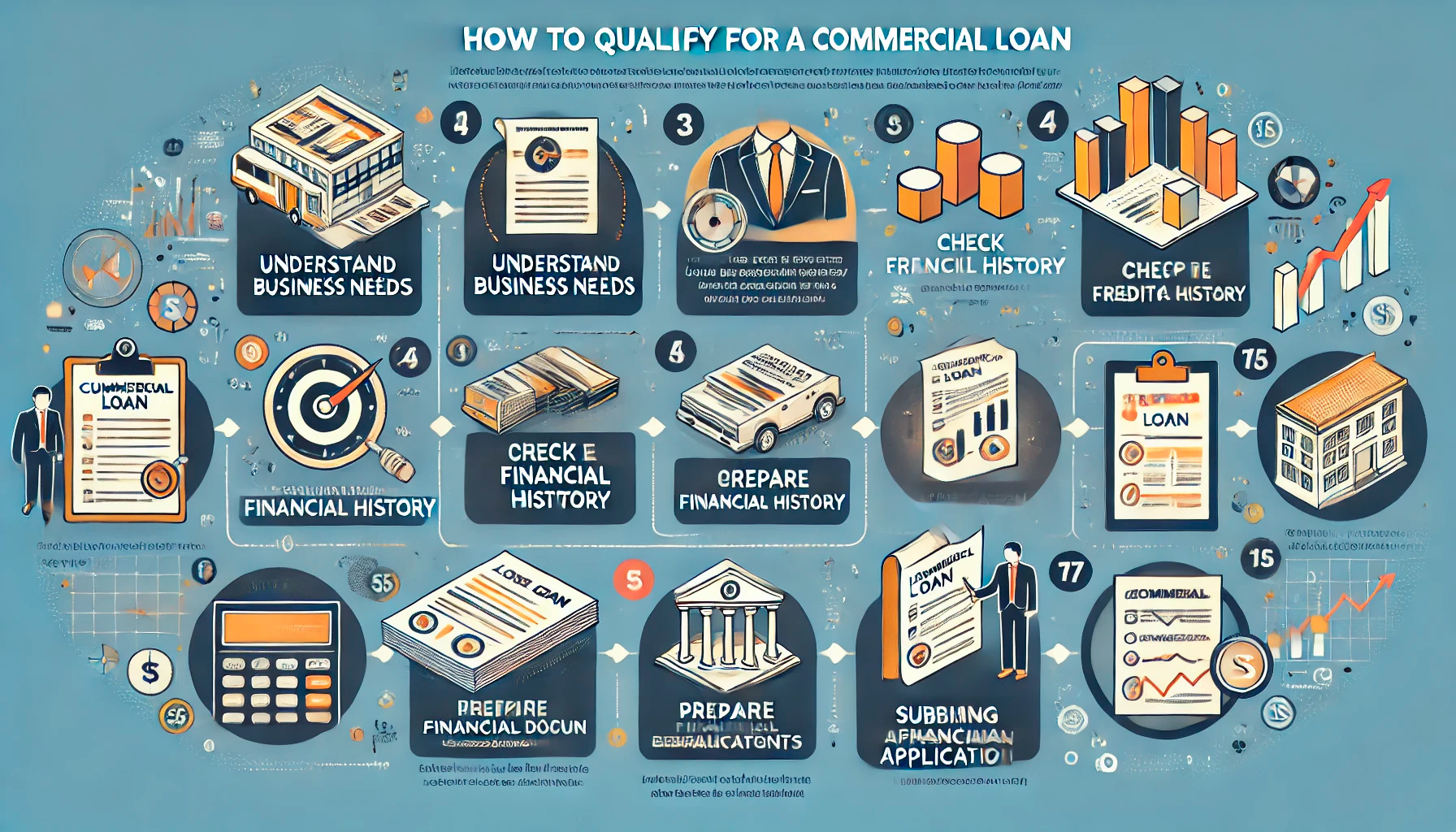
How to Qualify for a Commercial Loan: A Step-by-Step Guide
Securing a commercial loan is a crucial step for businesses seeking to grow, expand, or manage cash flow. However, qualifying for such financing requires careful preparation and a clear understanding of lender requirements. This step-by-step guide will help you navigate the process, improve your chances of approval, and secure the funding your business needs.
Step 1: Understand Your Business Needs
Before applying for a commercial loan, it’s essential to have a clear understanding of why you need the funds and how you plan to use them. Whether it’s for purchasing equipment, expanding operations, or managing seasonal fluctuations, defining the purpose of the loan helps you determine the amount needed and the most suitable type of loan.
This clarity not only guides your decision-making but also strengthens your application by showing lenders that you have a focused plan for using the funds effectively.
Step 2: Assess Your Financial Health
Lenders evaluate your financial health to determine your ability to repay the loan. Review your business’s financial position, including revenue, expenses, and cash flow. Be prepared to provide detailed financial documents such as:
- Profit and loss statements
- Balance sheets
- Cash flow projections
- Tax returns
These records demonstrate your business’s stability and provide lenders with the information they need to assess risk.

Step 3: Check Your Credit History
Your credit history plays a significant role in qualifying for a commercial loan. Both your personal and business credit scores will be evaluated. A strong credit score reflects reliability and lowers perceived risk for lenders, increasing your chances of approval and potentially qualifying you for better terms.
If your credit score needs improvement, take steps to address issues before applying, such as paying off existing debts or correcting inaccuracies in your credit report.
Step 4: Determine Collateral Availability
Many commercial loans require collateral, such as real estate, equipment, or inventory, to secure the loan. Collateral reduces the lender’s risk and can improve your chances of approval. Determine what assets you can offer and their estimated value.
If you prefer an unsecured loan, be prepared to demonstrate strong financial health and a high credit score, as these loans typically involve more stringent approval criteria.
Step 5: Prepare a Detailed Business Plan
A comprehensive business plan is a key component of your loan application. It should outline your business model, target market, revenue projections, and growth strategy. Highlight how the loan will contribute to achieving your goals and improving your business’s performance.
Lenders want to see that you have a realistic and well-thought-out plan for using the funds and generating a return on investment. A strong business plan demonstrates your commitment and increases lender confidence.
Step 6: Research Potential Lenders
Not all lenders are the same, and finding the right one for your business is critical. Research banks, credit unions, and online lenders to compare their offerings. Consider factors such as:
- Interest rates
- Repayment terms
- Loan amounts
- Application processes
Each lender has its criteria and specialties, so choose one that aligns with your needs and financial situation.
Step 7: Gather Required Documentation
Most lenders require a set of standard documents as part of the application process. These may include:
- Business licenses and registrations
- Financial statements (profit and loss, balance sheet)
- Tax returns (business and personal)
- Bank statements
- Lease agreements (if applicable)
Having these documents ready in advance ensures a smoother application process and demonstrates your preparedness.

Step 8: Demonstrate Cash Flow and Repayment Ability
Lenders need assurance that you can repay the loan on time. Use your cash flow statements and projections to show how your business generates revenue and manages expenses. Highlight consistent income streams or future contracts that guarantee revenue.
A clear repayment plan further reassures lenders. Specify how loan payments will fit into your budget and how the investment will generate returns that cover the loan.
Step 9: Understand Loan Terms and Costs
Before applying, familiarize yourself with the terms and costs associated with commercial loans. Key factors to consider include:
- Interest rates: Fixed vs. variable rates
- Fees: Origination fees, prepayment penalties, or other charges
- Loan term: Length of repayment period
- Total cost of borrowing: Consider both principal and interest
Understanding these terms ensures you can select a loan that aligns with your financial capacity and avoids unexpected costs.
Step 10: Submit a Strong Application
With all the necessary preparations in place, submit your application to your chosen lender. Ensure your application is complete, accurate, and tailored to the lender’s requirements. Highlight key points from your business plan and financial statements that demonstrate your ability to repay the loan.
Step 11: Be Prepared for Follow-Up
Lenders may request additional information or clarification after reviewing your application. Respond promptly and provide the requested details to avoid delays in the approval process.
Step 12: Negotiate Terms if Needed
If your application is approved, review the loan offer carefully. Negotiate terms if necessary, such as interest rates or repayment schedules, to ensure the loan meets your needs. A clear understanding of the terms ensures you can manage the loan effectively.
Conclusion: Achieving Success with the Right Preparation
Qualifying for a commercial loan requires thorough preparation, a clear understanding of your financial position, and a compelling application. By following these steps, you can increase your chances of securing the funding your business needs to grow and thrive.
With the right loan in place, you’ll have the resources to pursue opportunities, overcome challenges, and achieve your business goals. The effort invested in preparing for a commercial loan not only improves your chances of approval but also sets the foundation for a successful financial future.
